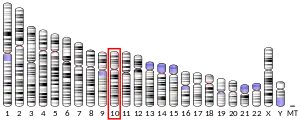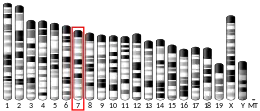UTF1
Undifferentiated embryonic cell transcription factor 1 is a protein in humans that is encoded by the UTF1 gene. [5] UTF1, first reported in 1998, is expressed in pluripotent cells including embryonic stem cells and embryonic carcinoma cells.[6] Its expression is rapidly reduced upon differentiation. UTF1 protein is localized to the cell nucleus, where it functions to regulate the pluripotent chromatin state and buffer mRNA levels by promoting degradation of mRNA.[7]
| UTF1 | |||||||||||||||||||||||||
|---|---|---|---|---|---|---|---|---|---|---|---|---|---|---|---|---|---|---|---|---|---|---|---|---|---|
| Identifiers | |||||||||||||||||||||||||
| Aliases | UTF1, undifferentiated embryonic cell transcription factor 1 | ||||||||||||||||||||||||
| External IDs | OMIM: 604130 MGI: 1276125 HomoloGene: 48226 GeneCards: UTF1 | ||||||||||||||||||||||||
| |||||||||||||||||||||||||
| |||||||||||||||||||||||||
| Orthologs | |||||||||||||||||||||||||
| Species | Human | Mouse | |||||||||||||||||||||||
| Entrez | |||||||||||||||||||||||||
| Ensembl | |||||||||||||||||||||||||
| UniProt | |||||||||||||||||||||||||
| RefSeq (mRNA) | |||||||||||||||||||||||||
| RefSeq (protein) | |||||||||||||||||||||||||
| Location (UCSC) | Chr 10: 133.23 – 133.23 Mb | Chr 7: 139.94 – 139.95 Mb | |||||||||||||||||||||||
| PubMed search | [3] | [4] | |||||||||||||||||||||||
| Wikidata | |||||||||||||||||||||||||
| |||||||||||||||||||||||||
Aberrant expression of UTF1 has also been reported in cervical cancer cells, where the UTF1 gene promoter loses methylation and becomes abnormally expressed compared to normal cervical cells.[8]
References
- GRCh38: Ensembl release 89: ENSG00000171794 - Ensembl, May 2017
- GRCm38: Ensembl release 89: ENSMUSG00000047751 - Ensembl, May 2017
- "Human PubMed Reference:". National Center for Biotechnology Information, U.S. National Library of Medicine.
- "Mouse PubMed Reference:". National Center for Biotechnology Information, U.S. National Library of Medicine.
- "Entrez Gene: Undifferentiated embryonic cell transcription factor 1". Retrieved 2013-05-30.
- Okuda A; Fukushima A; Nishimoto M; Orimo A; Yamagishi T; Nabeshima Y; Kuro-o M; Nabeshima Yi; Boon K; Keaveney M; Stunnenberg HG; Muramatsu M. (April 1998). "UTF1, a novel transcriptional coactivator expressed in pluripotent embryonic stem cells and extra-embryonic cells". EMBO J. 17 (7): 2019–32. doi:10.1093/emboj/17.7.2019. PMC 1170547. PMID 9524124.
- Jia J, Zheng X, Hu G, Cui K, Zhang J, Zhang A, Jiang H, Lu B, Yates J, Liu C, Zhao K, Zheng Y (October 2012). "Regulation of pluripotency and self- renewal of ESCs through epigenetic-threshold modulation and mRNA pruning". Cell. 151 (3): 576–89. doi:10.1016/j.cell.2012.09.023. PMC 3575637. PMID 23101626.
- Guenin S, Mouallif M, Deplus R, Lampe X, Krusy N, Calonne E, Delbecque K, Kridelka F, Fuks F, Ennaji MM, Delvenne P (August 2012). "Aberrant promoter methylation and expression of UTF1 during cervical carcinogenesis". PLOS ONE. 7 (8): e42704. doi:10.1371/journal.pone.0042704. PMC 3411846. PMID 22880087.
Further reading
This article is issued from Wikipedia. The text is licensed under Creative Commons - Attribution - Sharealike. Additional terms may apply for the media files.



